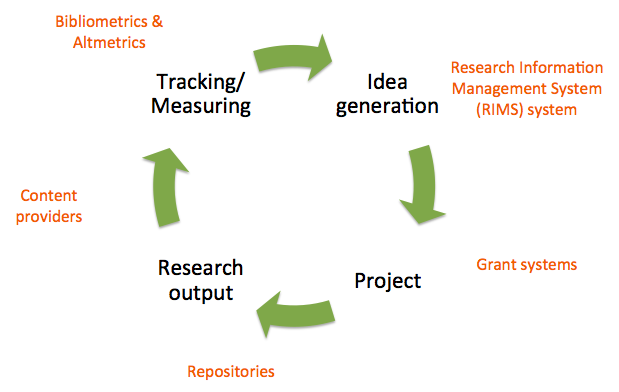Last month I posted a blog about ORCID and research management in Southern Africa, and our workshop at SARIMA.
I’m delighted to say that, since then, interest in ORCID has continued to grow in the Middle East & Africa region. We’ve had several discussions with research institutions in Southern Africa and a number are now reviewing institutional membership to ORCID. Several institutions have begun testing an ORCID integration with their institutional repository. Through an engaged community and ORCID integration points throughout the research lifecycle, we are are working toward our goal to connect research information with the researchers who produce it, across systems and sectors (see Figure 1).

Figure 1: Integration points of ORCID iDs through the research process
Here are some examples of ORCID work underway or planned in the Middle East & Africa region:
Adoption by researchers
An ad hoc analysis of researchers in the ORCID registry with South African research institution affiliations found a close correlation between total count by institution and university rankings (based on Times Higher Education ranking and QS university rankings).
Research Information Management Systems (RIMS)
Exciting news from Roger Wood, Associate VP: Product Management of InfoEd Global, one of the leading RIMS providers in South Africa, “InfoEd Global is excited to see the progress at ORCID and will soon be offering our client institutions the ability to integrate ORCID iDs into their researcher profiles. We continue to explore additional options for integration that may benefit our clients.” There was good news from Digital Science during the ORCID workshop at SARIMA in May about how ORCID can be used to connect information. Thomson Reuters with Converis and Elsevier with Pure also provide integration with ORCID.
Grant systems
Building on the funder linkage, we have had several discussions with the National Research Foundation in South Africa, who are busy evaluating ORCID and possible integration to their grant and peer review workflows and, as previously reported, the Wellcome Trust will be mandating the use of an ORCID iD in their grant application process from August 2015. This supports the link between research outputs and project to streamline post-award reporting for researchers and enable funder program assessments. In addition, our new peer review initiative will allow researchers to get credit on peer review work and funders to track review activities more accurately.
Academic institutions and repositories
Recently we met with ORCID member Stellenbosch University, who came on board in late 2014. Their Manager of Research Support and Research Commons Marie Roux comments, “We saw the urgent need to join as an ORCID member to fully take advantage of the integrating features and are very pleased that we were able to do so. There is no doubt that the use of ORCID by researchers are beneficial in terms of discoverability, author disambiguation, and saving time.”
King Abdullah University of Science and Technology, who joined a few months earlier, have already set up their member integrations with ORCID; several KAUST staff presented at the ORCID outreach meeting in Barcelona during May 2015. Their Director of Research Evaluation, Thibaut Lery, presented an interesting exploration of Gaps and Assumptions in Research Assessment, and we also heard from J. K. Vijayakumar, Collections and Information Services Manager, and Daryl Grenz, Digital Repository Coordinator, about using ORCID iDs to improve research impact and repositories. We were especially pleased to see the ORCID libguide that KAUST has put together for its researchers.
I also met recently with Nora Buchanan, Licensing Manager from the SANLiC consortium to discuss how we could work together to grow the adoption of ORCID in the region.
Content providers
During June we met with some of the local content providers in Africa, including Erika Janse van Rensburg, Product Manager: Content Services at SABINET, who provide the South African ePublications and other local content to the African market. She commented that, “SABINET can see the value ORCID identifiers add to the research community”, and we are looking forward to continuing our discussions. We also work with a number of global content providers, whose integrations are listed on our website. Working with content providers ensures better visibility of the researcher’s profile on various platforms as well as within the research paper. It also aids discoverability because users have the ability to limit a search query based on an ORCID iD.
Bibliometrics and altmetrics
ORCID has been working with some of the leading bibliometric and altmetric platform providers on a number of interesting integrations. For example, researchers can now easily track their altmetrics through Impactstory, Altmetric, and PlumX. We have also worked with Elsevier and Thomson Reuters to integrate ORCID iDs into their analytics platforms, Scival and InCites respectively. This supports better accuracy in research outputs tracking and analysis for researchers and the research office alike.
Upcoming events
Exciting news, on the horizon, is the first ORCID workshop in East Africa. Together with the University of Nairobi, on July 23 we will be co-hosting a Kenya ORCID workshop. During the same week, we will be attending the EIFL workshop, Making Research Data Open at Addis Ababa University in Ethiopia.
We will be attending the IFLA conference in Cape Town in August, and presenting a paper at the IFLA ARL Satellite Meeting. In September, we will be traveling to the Middle East for events in Qatar and Saudi Arabia.
I am also looking forward to exploring the West Africa market where there is growing adoption by individuals who are registering for ORCID iDs.
Share your ideas for the region
I am excited about the prospects for the Africa & Middle East region and I look forward to collaborating with the community on a digital framework to distinguish researchers, improve discoverability, showcase regional research contributions, and reduce administrative burden. Please do contact me to discuss any ideas that you may have.
Work in this region is a continuation of ORCID’s growing global outreach program, made possible as a result of a grant from The Leona M. and Harry B. Helmsley Charitable Trust.
